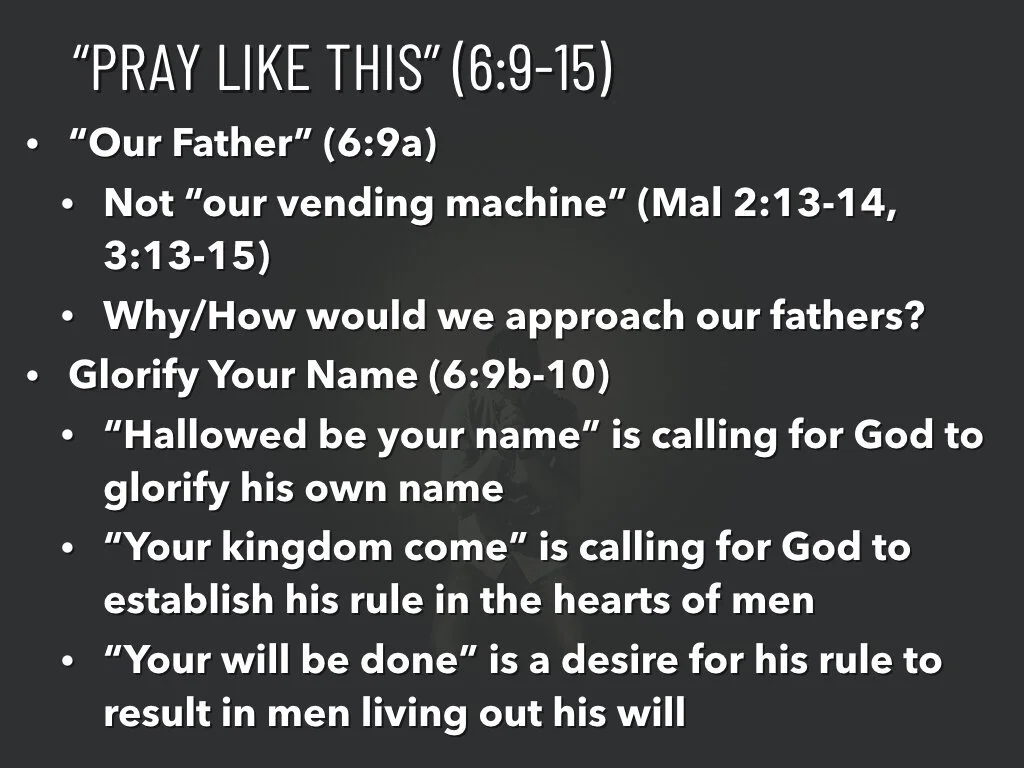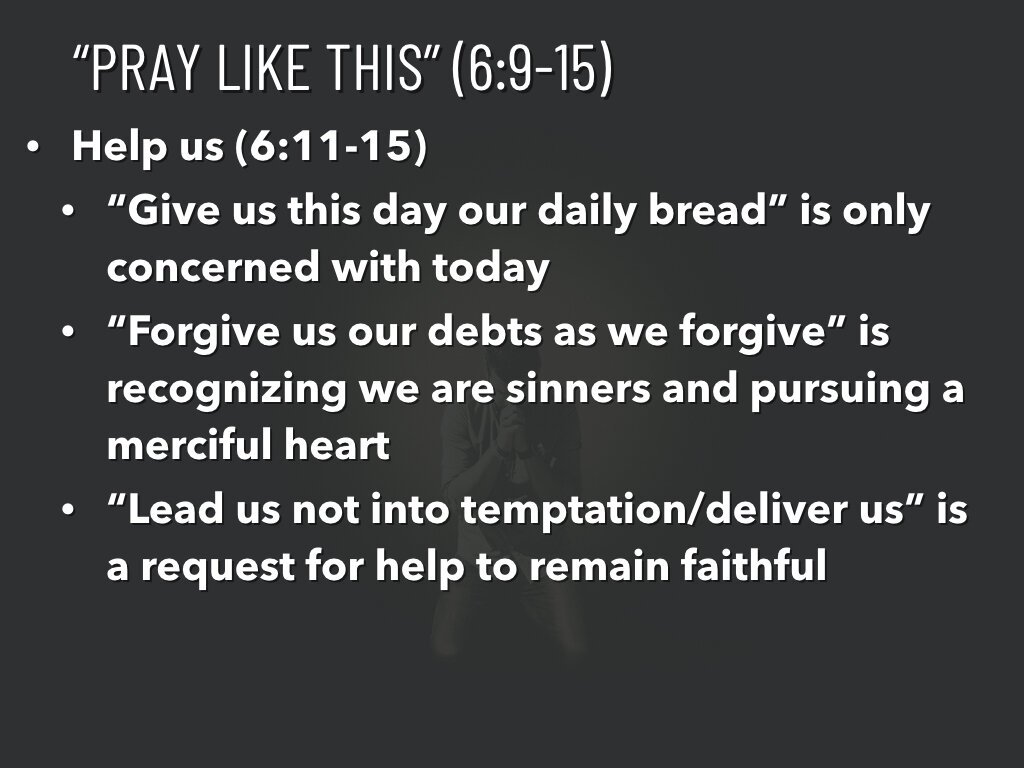Praying For God's Glory (Matthew 6:5-15)
March 1, 2020
The first example he gave us of this is probably the most obvious. Jesus said, “When you give to the needy.” There is an expectation that his people would give to the needy. We explored that last time and saw how we tend to sound a trumpet when we make a sacrifice to help others. After we give to someone in need, we like to receive some benefit for it. Instead, Jesus wants us to hide our good deeds from ourselves so that we don’t dwell on it and seek the approval of men.
When You Pray
Today, we will look at his second example of this. In verses 5-15, Jesus talks about seeking our glory in prayer. At first, this seems pretty far fetched. Who in their right mind would seek their own glory in prayer? But Jesus goes into great detail about the ways we seek our own glory and fail to seek God’s glory. Then, he helps us understand how to pray in a way that glorifies God.
Don’t Seek Glory
Matthew 6:5 (ESV) --- 5 “And when you pray, you must not be like the hypocrites. For they love to stand and pray in the synagogues and at the street corners, that they may be seen by others. Truly, I say to you, they have received their reward.
Jesus starts by pointing to the religious people who would take every opportunity to pray in front of other people so that others would see them. The goal of their prayer is not to speak to God or to praise God. They heap up words of praise and seem to adore God sincerely, but the whole purpose behind their prayer is to be seen by men as righteous. They are hypocrites. They are actors on a stage showing people that they are genuinely righteous when, in fact, they are self-promoting and self-seeking. These guys might be thinking that they are doing something righteous for God. If we were in the audience, we might hear their prayers, be deceived, and believe that they are righteous people who love God with all their heart. But God knows that they are looking for the approval of men as they pray. Jesus says not to pray like them because they have received their reward.
Pray In Secret
Matthew 6:6 (ESV) --- 6 But when you pray, go into your room and shut the door and pray to your Father who is in secret. And your Father who sees in secret will reward you.
Jesus then says that when we pray, we are to “Go into your room and shut the door.” He wants us to hide from the outside world when we go to God in prayer. Prayer is supposed to be a more intimate conversation that is for God and not man. Isn’t it sad that we would take the blessing we have to approach the throne of God and use it as an opportunity to glorify ourselves? Can you imagine doing this with our spouse? In front of everyone at the office, we offer up praise to our wife or husband and tell them how wonderful they are. We make promises to them, and we show ourselves to be the best husband or wife ever. Then, we get home and ignore our spouse. On the one hand, they might be touched that we weren’t ashamed of them. But they know that there is no real love for them.
God wants us to pray to him in secret, knowing that he hears every word. Praying in front of other people or at a spiritual location like the temple or synagogue is not wrong, but it does not make God hear our prayers and respond. He hears everything we say in the private room. We may pray silently, but in those days, they would almost always pray and read out loud. Notice that Jesus does not say to pray silently. He encourages prayer out loud, but in a private place. I don’t think Jesus condemns praying silently, but he and others might recognize that praying out loud is good for us. If you haven’t prayed out loud, I encourage you to do that. Speak to God with your voice. Let your emotions pour out, but don’t do it to be seen by others. Do it in secret. God will know that prayer and reward you.
Don’t Speak Empty Words
Matthew 6:7 (ESV) --- 7 “And when you pray, do not heap up empty phrases as the Gentiles do, for they think that they will be heard for their many words.
After pointing to the hypocritical Jews, he points to the error of the Gentiles. They were thinking about prayer as a means to impress God with their many words and their eloquent speech. But God does not care about the amount of time we spend in our prayers. Nor does he care about the way that we speak. He is not sitting there with a stopwatch to see if we meet a quota of prayer time every day. God is not impressed by anything we do to sound impressive. Praying in a particular language does not make God listen more carefully.
What is the problem? Some of your translations may say, “vain repetitions.” The CSB says, “Babble.” The problem is that they were focused on the wrong things as they are praying. They are talking and talking to show that they are sacrificing their time to speak to God, but the things that they say are meaningless. Why would anyone do that? They are trying to manipulate God. The point of prayer is not to manipulate God into giving us what we want because we are so righteous. He is not looking for the right combination of words or the right amount of time being spent to be sure that we really mean what we say. The greatness of our vocabulary and the volume of words does not matter to him. He wants us to be direct and to speak to him with a recognition of who he is.
Be Direct
Matthew 6:8 (ESV) --- 8 Do not be like them, for your Father knows what you need before you ask him.
So Jesus wants us to be direct with God about the thoughts that are going through our mind and weighing on our hearts because they are not a mystery to him. We shouldn’t view prayer as going through some formal routine to reveal what is on our hearts. God already knows everything that is on our hearts before we even begin to talk to him. When we read this, we may be tempted to say, “What is the point of praying if God already knows what we need?” It may seem like this is all just a big waste of time. If prayer is not our opportunity to let God know some new information about our life, why would we do it? This may be a reason why we often fail to pray. We don’t understand the purpose behind it. In the next section, Jesus gives us an example of prayer that helps us see a purpose in prayer. It is probably unlike any of our prayers. Listen to his prayer, notice how direct it is, and see the purpose behind prayer.
Pray Like This
Matthew 6:9--13 (ESV) --- 9 Pray then like this: “Our Father in heaven, hallowed be your name. 10 Your kingdom come, your will be done, on earth as it is in heaven. 11 Give us this day our daily bread, 12 and forgive us our debts, as we also have forgiven our debtors. 13 And lead us not into temptation, but deliver us from evil.
Many people take this prayer and ritualize it, which is the opposite of what Jesus just said. The words leading up to this prayer were warning people not to heap up empty phrases or vain repetitions. This is a prayer that helps us see the difference between Jesus’ prayers and our prayers.
Father
Let’s think about some different aspects of this prayer. First, notice that it is addressing God as “Our Father.” Is this the way we view our relationship with God as we pray? The Jews throughout history repeatedly lost the understanding of God as their Father. In Malachi, they were upset with God because he wouldn’t give them what they wanted. They saw him like a vending machine where they provide a sacrifice with weeping and groaning, and they get a good harvest. The whole time they were doing all that they were unfaithful to their wives and committing all kinds of sins (Mal 2:13-14). Then, when God didn’t answer their prayers, they would say, “It is vain to worship God” (Mal 3:13-15). They are saying that God did not give me what I want, so forget him. That’s not how we treat our fathers. He tells them that if they served him faithfully, he would provide everything they need. Our whole perspective has to look at God as we do our fathers. If a child wants to bribe me or manipulate me while doing all kinds of rebellious things, I’m not going to give them a new X-Box or whatever they want. It’s just not going to happen.
John 14:8--9 (ESV) --- 8 Philip said to him, “Lord, show us the Father, and it is enough for us.” 9 Jesus said to him, “Have I been with you so long, and you still do not know me, Philip? Whoever has seen me has seen the Father. How can you say, ‘Show us the Father’?
When we pray, we pray to God, the Father through Jesus, the Son. Jesus is the way we have access to God. But he also says that he has shown the disciples precisely what the Father is like. We can speak to the Father, knowing what he is like because Jesus is just like him. He is the perfect image of God.
Glorify Your Name
After setting the stage for the whole prayer, we see two sets of three. In the first set of three, we see Jesus praying for God to lift himself and glorify himself among mankind. “Hallowed be your name,” “Your kingdom come,” and “Your will be done” are all seeking for God to do something that will help others know how wonderful God is. Is this the way we view prayer?
“Hallowed be your name” is calling for God to sanctify his name and make it holy in all the earth. Jesus wants everyone to understand God’s majesty and lift up God in praise and honor for what he has done for mankind.
“Your kingdom come” is calling for God to establish his rule and authority on earth. The funny thing about this statement is that God is already ruling over the kingdoms of the earth. He shows that over and over again in the prophets (Eze 25-32, Isaiah 13-24, Daniel, Habakkuk, Zephaniah). So it is not as though Jesus wants God to create a new Israel and have them conquer Rome. But in the spiritual realm, Satan is the prince of the power of the air. This is ultimately about conquering the rule of sin by the true Israel of God having an influence and bringing God’s blessings to new areas. That could mean the initial spread of the church across the globe, but there is a sense in which the kingdom would spread into new areas today. As we talk to our neighbors, this is taking place.
“Your will be done on earth as in heaven” is calling for the same idea as the first two. He wants there to be an overall submission to God’s will and a recognition that he is wonderful, majestic, and worthy of all our praise and adoration.
In these three requests, we can see that our prayers are supposed to be God-focused with a desire for God’s glory. He wants us to make him our ultimate desire. That means that before we even get to think about what God can do for us, we are thinking about who God is and what God wants to happen on earth.
Help Us
The last section on prayer transitions to three new things. These three things are a summary of all that we might want God to do for us.
“Give us this day our daily bread” is asking God to provide what we need for today. Notice the repetition of “this day” and “daily.” Jesus wants us only to be concerned with today. Why is that? We love to pray about what we need this week, this month, or this year. But why would we be so concerned about things that are far away when we serve a God who can change our circumstances in a blink of an eye. Jesus wants us to be focused on today so that we don’t waste it worrying about tomorrow or yesterday.
“Forgive us our debts as we forgive our debtors” is a recognition that we are sinners. We do not pray like the Pharisee saying, “Thank you Lord for not making me like a tax collector and sinner.” We pray like the tax collector, recognizing that we have fallen short of God’s glory. Attached to that is an admonition to forgive our debtors. Jesus will touch on this multiple times throughout this book. We are supposed to be merciful since we recognize how much mercy we have received. Interestingly, Jesus goes back to this request after the prayer to explain it in verse 14.
Matthew 6:14--15 (ESV) --- 14 For if you forgive others their trespasses, your heavenly Father will also forgive you, 15 but if you do not forgive others their trespasses, neither will your Father forgive your trespasses.
“Lead us not into temptation/deliver us from evil” is an all-inclusive kind of request. Whatever the temptation or desire that is inside of us, we need to ask for God’s help to get out of it. We need God to work in such a way that we would be delivered from the evil opportunities that surround us. This is a prayer for rescue by any means necessary. God may answer this prayer by allowing us to go through a trial, or we may find that the word of God helps us get out of these temptations as we apply it.
The most interesting aspect of all of this section of prayer for ourselves is that Jesus does not ask for God to give him a comfortable life. He does not ask for suffering to stop or for additional blessings. He asks for the bare essentials to be met and for God’s help in remaining faithful to him.
How Do We Pray?
Now that we have looked at all of this let’s talk about prayer. Why do we pray, and how do we pray? Jesus shows us in this text that it is expected that we would pray. But he warns us against praying to promote our righteousness or to manipulate God like a genie in a bottle or a vending machine. We do not pray to inform God of our needs or desires. He already knows all of that. So why pray?
1. Refocusing on God
We pray to speak to our Father. We pray to rely on him to do what we should want most of all, glorify his name. We pray to find help with life while we focus on faithfulness and shine as lights for God’s glory. In a sense, our prayers are for us because they help us to refocus our hearts on our Father’s will and submit to it. God doesn’t need our prayers, but he wants them. We need them to help us focus on the right things.
2. Prayer Changes God’s Will
We must also remember that prayer does change things. We might be confused by this because we get confused about God’s will. We want God’s will to be done, but we want to change God’s will. How does that make sense? He has a sovereign will that will not be altered by anything, nor do we want it to be changed. But God also has a permissive will where he allows our prayers to have great power. Jesus said that God would reward us if we are praying with the right focus and for the right reasons. Praying in secret and thinking carefully about what we say before we say it is effective prayer. It’s not about the number of words. Eloquence and popularity among men mean nothing to God when we pray. Instead, we pray in secret with well thought out words, showing a heart that wants God to be glorified first and foremost. That prayer has power!
James 4:2--3 (ESV) --- 2 You do not have, because you do not ask. 3 You ask and do not receive, because you ask wrongly, to spend it on your passions.
James 5:16 (ESV) --- 16 Therefore, confess your sins to one another and pray for one another, that you may be healed. The prayer of a righteous person has great power as it is working.
Conclusion
Praying is not a waste of time or an opportunity for us to manipulate God. It is a blessing that a child of God can enjoy through Jesus’ sacrifice. The Hebrew writer says we can boldly approach the throne of God and find grace to help in time of need. Let us pray like this. If you are not a child of God, you are missing out on this tremendous blessing of approaching God as your Father. Will you let him adopt you as he has adopted us?






